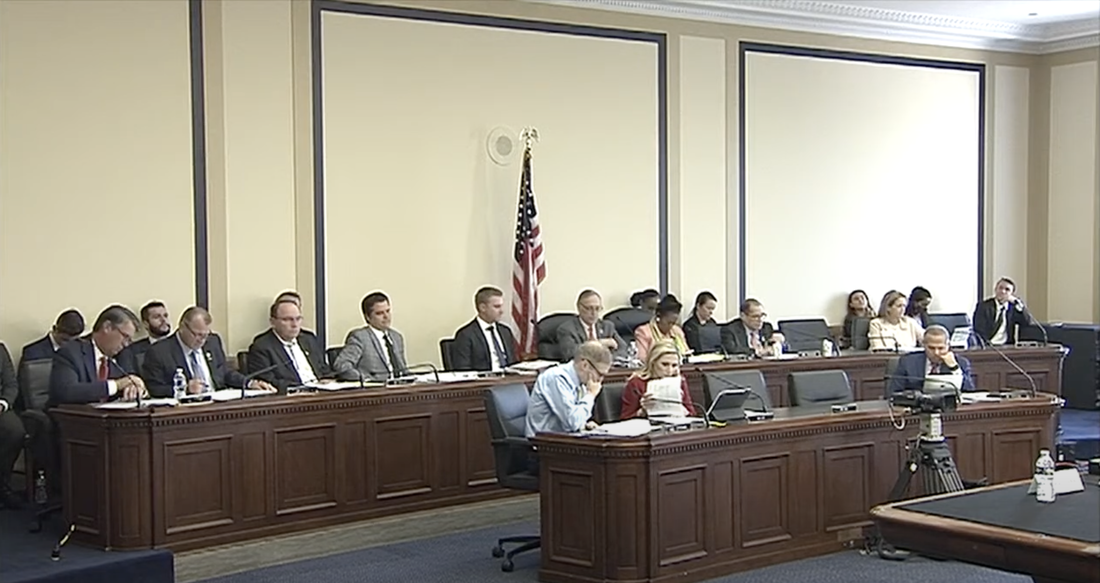|
A House subcommittee hearing today demonstrated widespread, bipartisan recognition of the need to reform Section 702 of the Foreign Intelligence Surveillance Act (FISA). Both the Chairman and Ranking Member of the full House Judiciary Committee – Rep. Jim Jordan (R-OH) and Rep. Jerry Nadler (D-NY) – called for their committee colleagues to lead bipartisan reforms to prevent further, significant abuses of this authority. Jordan, looking over his shoulder to Rep. Nadler, highlighted “the fact that we can get bipartisan on protecting civil liberties.” Subcommittee chairman Andy Biggs (R-AZ) had earlier opened the hearing by saying Section 702 reform requires a “rare bipartisan effort.” Rep. Jerry Nadler (D-NY) agreed bipartisan action is needed. He complained about the government “keeping us in the dark” on the numbers of warrantlessly collected data of Americans. The result of this secrecy, he said, is the backdoor surveillance of Americans that “is neither hypothetical nor rare.” Sharon Bradford Franklin, chair of the independent watchdog of the independent agency that protects civil liberties in government counterterrorism programs, spelled out three specific reforms. Even the title of the hearing, “Fixing FISA: How a Law Designed to Protect Americans Has Been Weaponized Against Them,” was telling. It set the tenor of skeptical and substantive questions from representatives from both parties. By the end, it was clear that the push for Section 702 reform is strong and accelerating. Franklin, Chair of the Private and Civil Liberties Oversight Board (PCLOB), noted that Section 702 – because it aims to collect the data of foreigners presumed to be located abroad – does not need to observe the Fourth Amendment requirement for a probable cause warrant. Nevertheless, Americans’ communications get “incidentally” caught up in this surveillance. “The term incidental makes it sound like a small amount, but we don’t actually know the scope of this collection,” Franklin said. “The government argues it is not feasible to calculate a meaningful number.” “They won’t tell us,” Chairman Jordan said sharply. “No idea how many Americans are pulled into incidental collection – the FBI won’t tell us.” He later fired a warning shot, “How about we put the FBI out of this business altogether?” There was widespread recognition among committee members that the FBI is withholding any suggestion of the magnitude of incidental collection. This was a perfect set-up for Franklin to make the first of her three recommendations.
Franklin then turned to how Section 702 – an authority designed by Congress to permit the surveillance of foreigners – has become a method by which the government can warrantlessly surveil Americans. “No judge ever reviews analysts’ targeting procedures,” she said, because they target foreigners who do not enjoy U.S. constitutional protections. Thus, she said, there is no judicial review on the front-end of the process. Nor, because the authority is ostensibly about foreigners, is there a warrant “requirement at the backend to establish probable cause or obtain permission from a federal judge,” even when Americans become the target of 702 surveillance. This is what, Franklin said, privacy advocates mean by Section 702 enabling “backdoor searches.” She noted the FBI has recently released a set of reforms and improvements to its FISA process. These include changing default settings in the FBI’s query system so agents must affirmatively opt in to have their queries run through 702 data and establishing special approvals for sensitive queries such as those involving elected officials, members of the media, academia, and religious leaders. “These reforms are welcome,” Franklin said, “but I do not believe these changes are sufficient to address the privacy threats posed by these warrantless searches seeking information about specific Americans.”
Third and finally, Franklin addressed the issue of “abouts” information – collecting references from third parties about an American. In 2018, Congress suspended the collection of “abouts” data, but the current law allows the government to restart the practice at will. This is dangerous, she said, because it allows the government to “acquire communications extensively between people about whom the government had no prior suspicion, or even knowledge of their existence, based entirely on what is contained within the contents of their communications.”
Franklin’s testimony was a good summation of the issues at stake in Section 702, as well as her recommendations. Rep. Laurel Lee (R-FL) noted the call to require amici – legal experts in civil liberties – to advise the secret FISA court whenever it considers surveillance requests from the government that involve Americans’ fundamental freedoms in politics, religion, and journalism. Department of Justice Inspector General Michael Horowitz seemed to agree. He responded that in the secret hearings, “agents never face a challenge or a cross examination” unlike an ordinary criminal trial. Facing cross-examination by a privacy advocate, Inspector Horowitz said, “focuses the mind.” The lasting impact of the hearing will likely be Franklin’s three recommendations – to get the government to produce an estimate of incidental collection of Americans communications, to involve FISA court review of the query terms for Americans, and to remove the ability of the government to return to the collection of “abouts” information. Watch the full hearing: Comments are closed.
|
Categories
All
|


 RSS Feed
RSS Feed